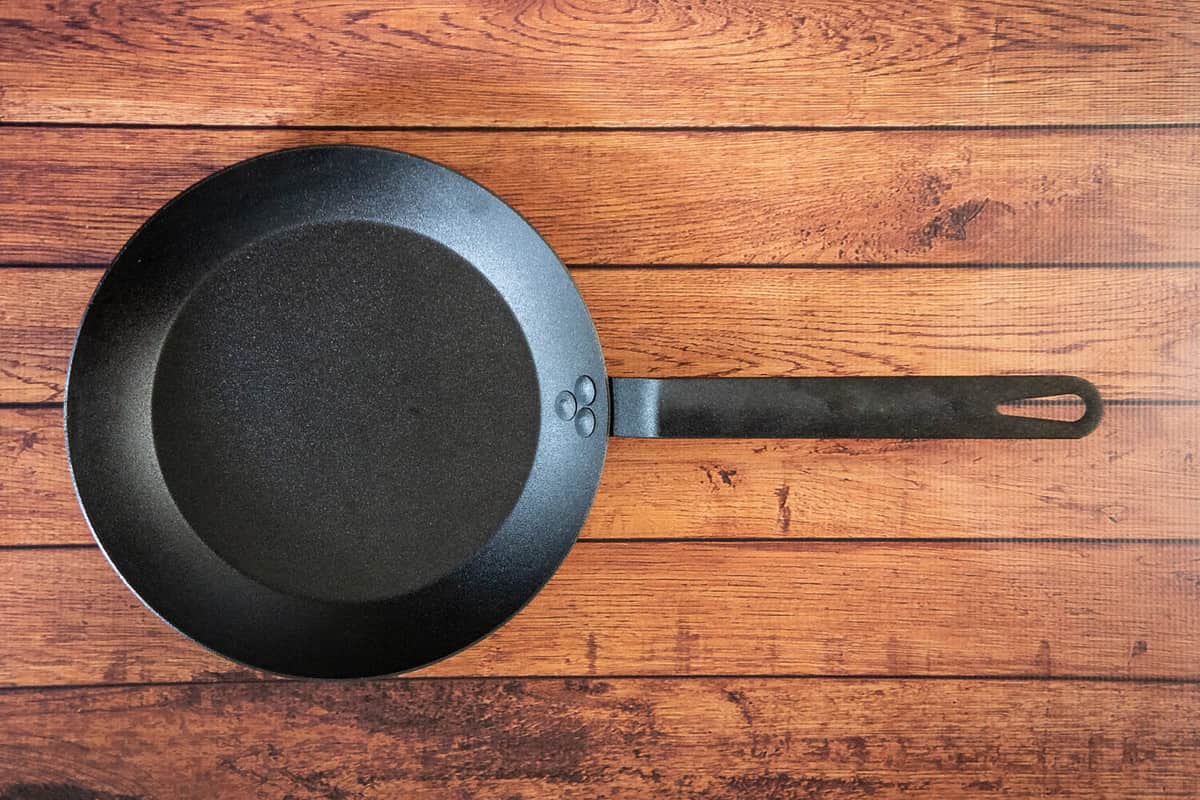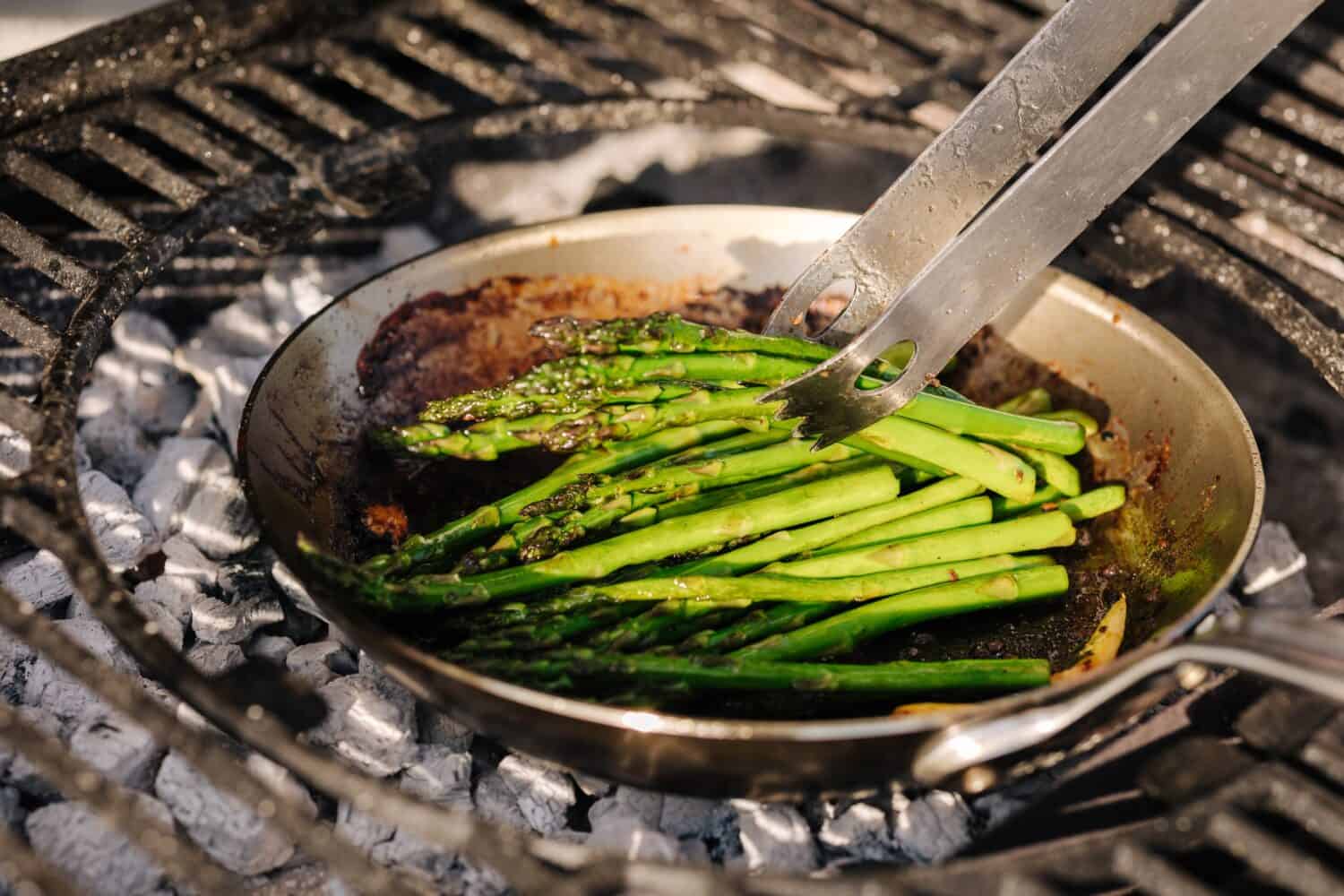Whether you’re looking for a new cookware set for your kitchen or you’re trying to find the perfect outdoor cookware, there are many types to consider. Especially when it comes to outdoor cookware, you need something lightweight enough for you to carry around. You also need something durable enough to withstand different conditions. In your search, it’s worth considering the difference between carbon steel vs. titanium cookware.
The main difference between carbon steel and titanium is their weight. While carbon steel is often seen as a good alternative to cast iron, it’s still much heavier than titanium. Titanium is the best option for lightweight cookware, but it’s not the best choice for cooking full meals or searing.
If you’re looking for the best cookware to bring on your next camping, hiking, or backpacking trip, keep reading to find out the differences between carbon steel and titanium.

Carbon steel is a great alternative to cast iron but is still heavier than titanium.
©Jaimieandkyleshootstock/Shutterstock.com
Carbon Steel vs. Titanium: What Is the Difference?
Titanium and carbon steel are two of the lesser-known types of cookware, especially when it comes to cookware used indoors. While carbon steel is seen as an alternative to cast iron and titanium is an alternative to stainless steel, they both have various uses as well as pros and cons.
The main difference between them is the weight of the material. Even though carbon steel is considered lightweight compared to cast iron, it’s still significantly heavier than titanium. Titanium, on the other hand, is one of the lightest types of cookware. This makes it great for carrying around, but it also means that it heats incredibly quickly.
While carbon steel is a better choice for use in an indoor kitchen, titanium has become a popular choice for those who are carrying cookware while backpacking, hiking, or camping.
Main Differences Between Carbon Steel vs. Titanium
Choosing the right type of cookware isn’t easy no matter what your choices are. If you’re considering whether carbon steel or titanium will work best for your kitchen , here are the main differences between them:
- Titanium is significantly lighter than carbon steel
Carbon steel can be a great option even for outdoor cookware. It shares a lot of the benefits of cast iron. However, titanium is still significantly lighter than carbon steel, so if it’s something that you’ll have to carry around outdoors, titanium can be a much more convenient option. - Carbon steel takes longer to heat up but stays warm longer
Thermal conductivity is always a factor to consider when it comes to choosing the right cookware for your kitchen or outdoor cooking. While carbon steel is a much lighter material than cast iron, it still is thicker than titanium and stainless steel, so it takes longer to heat up. However, one of the benefits of carbon steel compared to titanium is it does retain heat for longer, so your food is more likely to stay warm. - Titanium has hot spots
While titanium does heat up faster than carbon steel, it’s also more likely to have hot spots. It heats up quickly but isn’t necessarily going to cook as evenly. This makes titanium great for boiling water or even heating up previously cooked food, but it’s not as effective at searing or cooking full meals.
Both carbon steel and titanium have pros and cons and they can also both be beneficial cookware to have on hand. If you’re cooking outdoors or on the go, consider using either carbon steel or titanium cookware.
What Is Carbon Steel?
Carbon steel has become more popular in recent years and is a lightweight alternative to cast iron. While carbon steel is lighter than cast iron, it still has quite a bit of weight to it. If you’re planning on doing extensive cooking on an outdoor trip, carbon steel is better than titanium when it comes to cooking full meals and it’s much more versatile.
Carbon steel will be a bit heavy to carry in your backpack. However, if you’re camping out of an RV or even having a picnic outdoors and looking for something that’s not as heavy as cast iron, carbon steel is a great alternative.
Carbon steel has a lot in common with cast iron, but it doesn’t retain heat as well since it’s a lighter material. This type of cookware is made from a combination of iron and carbon like cast iron, but it has a lower carbon percentage. Carbon steel is more likely to have hot spots than cast iron but will still cook more evenly than titanium.
What Is Titanium?
Titanium cookware is incredibly lightweight and heats quicker than most other types of pots and pans. This makes it great for outdoor use, especially when you have limited resources or time to heat something up. If you’re planning on using the titanium cookware for boiling water or heating food, you’ll find it’s the most efficient outdoor cookware.
However, the thinness of the material leads to frequent hotspots and uneven cooking, which means it’s not the best cookware for searing, frying, or cooking full meals. Titanium also isn’t a great choice for use in an indoor kitchen, since it can’t compare to choices like stainless steel or cast iron.
Titanium is a popular choice because of how efficient it is compared to other camping cookware. This type of cookware is also durable enough for outdoor use and is corrosion-resistant. If you’re mostly planning on boiling water or reheating food, the best type of cookware for your camping trip is pure titanium.
Is Titanium More Affordable Than Carbon Steel?
When you look up titanium cookware online, you’ll find a wide variety of cookware. A lot of the most expensive titanium cookware is actually titanium-enforced, which means the cookware itself is stainless steel or another material but has a titanium cooking surface for durability.
Titanium cookware that’s specifically designed for cooking outdoors isn’t quite as expensive. You can find a titanium outdoor cooking set for around $50, depending on the brand. On the other hand, carbon steel is a bit more expensive with a high-quality skillet falling anywhere between $45-$70. For both types of material, the price ranges can vary depending on the quality of the cookware and the design.

When cooking outdoors, you need cookware that's light enough to carry around.
©Raland/Shutterstock.com
Titanium vs. Carbon Steel: Which Is Better for Lightweight Cooking?
If you’re looking for the most lightweight cookware, titanium is a great choice. It’s the best type of cookware to carry with you and the thinness of the material makes it simple to put in a backpack or in your camping gear without weighing you down.
While carbon steel can be a great alternative to cast iron, it’s not the best when it comes to lightweight cooking. It’s still significantly heavier than other types of cookware such as titanium, stainless steel, or aluminum. If you’re looking for something that’s light enough to carry around outdoors, titanium is the best choice.
Are Titanium and Carbon Steel Cookware Safe?
Pure titanium cookware is one of the safest options since it doesn’t have any synthetic materials. If you purchase a nonstick titanium pan that either has a titanium-enforced cooking surface or a ceramic coating, these are both safe options as well. Titanium is also nonreactive, which means the atoms in the cookware won’t react to acidic ingredients.
Carbon steel is also a safe type of cookware since it doesn’t come with a nonstick coating. This cookware is non-toxic and eco-friendly, so you don’t have to worry about it adding chemicals to your food.
Which Is Better: Titanium vs. Carbon Steel
Like most types of cookware, deciding which one is best is going to depend on what you plan on using it for. Carbon steel has become an effective and acceptable alternative to cast iron, but it’s not going to be as helpful for lighter-weight cooking.
If you’re looking for a new cookware set for your kitchen, you’re better off using carbon steel or a titanium-enforced cookware set. But if you’re looking specifically for something lightweight that you can use for outdoor cooking or traveling, titanium is the better choice. Unlike other types of cookware, titanium is both lightweight and strong enough to withstand any wear and tear on your next outdoor adventure.
The image featured at the top of this post is ©Studio113/Shutterstock.com
